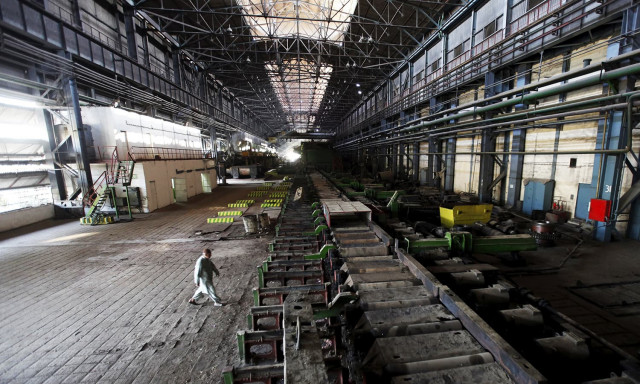AGP detects irregularities in PSM expenditures
Audit report says heavy billing incurred since 2015 despite zero production

The Auditor General of Pakistan has detected irregularities in the expenditures of the Pakistan Steel Mills – the country’s largest steelmanufacturing entity – since 2015, saying that its production was zero in that period yet water worth Rs65 million was used while the “cost of stores, spare parts and loose tools amounted to Rs97 million in 2017”.
Days after the PSM laid off over 4,500 of its employees, the audit report of the Auditor General of Pakistan (AGP) for 2019-20 on the accounts of the public sector enterprises sheds light on the financial issues that apparently contributed to the downfall of the PSM.
During the audit, the AGP observed that the PSM arranged water in bulk from Karachi Water and Sewerage Board (KWSB), adding that the water was to be used for production activities in the plant and for supply to PSM’s residential areas like Steel Town, Gulshan-e-Hadeed and commercial areas in the vicinity.
The AGP noted that the management admitted shortfall in recovery but failed to spell out the details of water consumption in huge quantity with almost nominal recovery from the users, which raised questions over water distribution system itself, especially Rs65 million worth of water for a non-functional plant, and required a probe.
According to the report, “The record of billing reflected that the PSM received a bill amounting to Rs412,503,336 [Rs412.5 million] for the period ending June 30, 2019 from the water board.” Also, the report said that the non-recovery of dues from “M/s Hadeed Welfare Trust amounted to Rs97.3 million”.
During the audit of PSM for the year 2018-19, the report said, it was observed from the record that the mills management failed to recover a huge amount of receivables to the tune of Rs552.4 million for the last many years.
The matter was reported to the management in October 2019 and in DAC meeting held in December 2019, the management said that it will take them considerable time to recover the amount.
During the year 2015-16, the AGP noted, sales were recorded at Rs3,029.3 million as compared to Rs7,031.7 million in 2014-15, registering a decline of 56.9 per cent. Sales further dropped to Rs435.2 million in 2016-17, showing a fall of 85.6 per cent as compared to that of 2015-16.
The AGP observed that the cost of sales showed a significant increase as compared to net sales over a period of three years, adding that it was 341 per cent in 2014-15, rose to 420 per cent in 2015-16 and further jumped to 2,022 per cent; which required elucidation.
Net loss after tax for 2016-17 was Rs1,907.9 million as compared to net loss after tax of Rs17,234 million in 2015-16, the report read, adding that the accumulated losses of the corporation continued to rise from Rs141,618 million in 2014-15 to Rs157,806.38 million in 2015-16, showing an increase of 11.43 per cent.












1724319076-0/Untitled-design-(5)1724319076-0-208x130.webp)






COMMENTS
Comments are moderated and generally will be posted if they are on-topic and not abusive.
For more information, please see our Comments FAQ